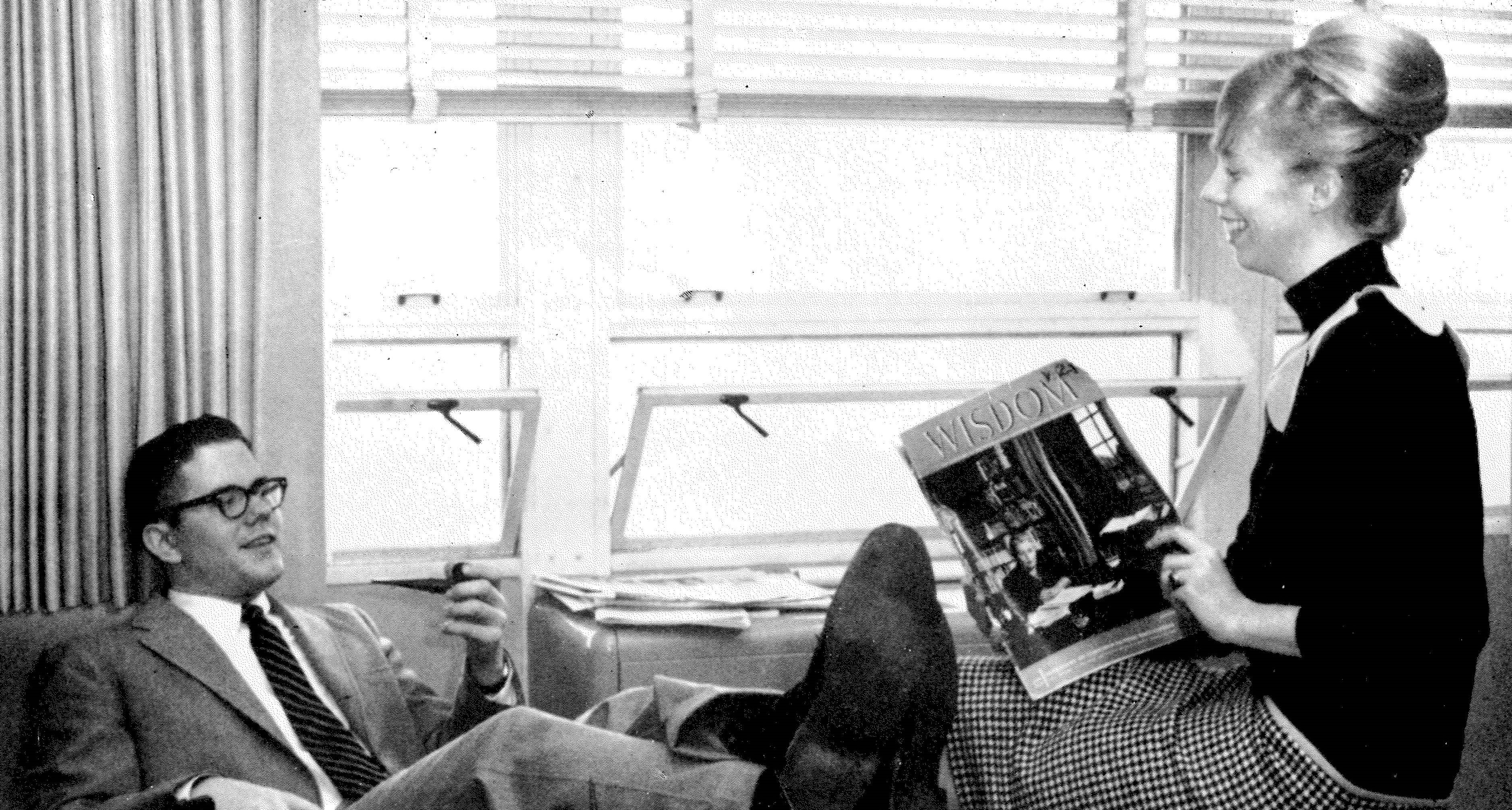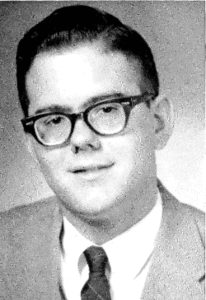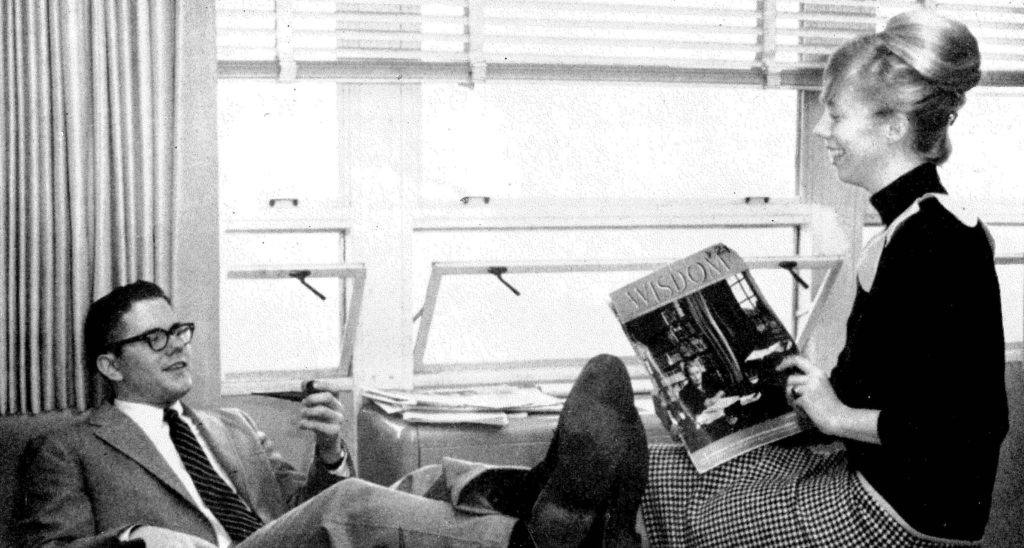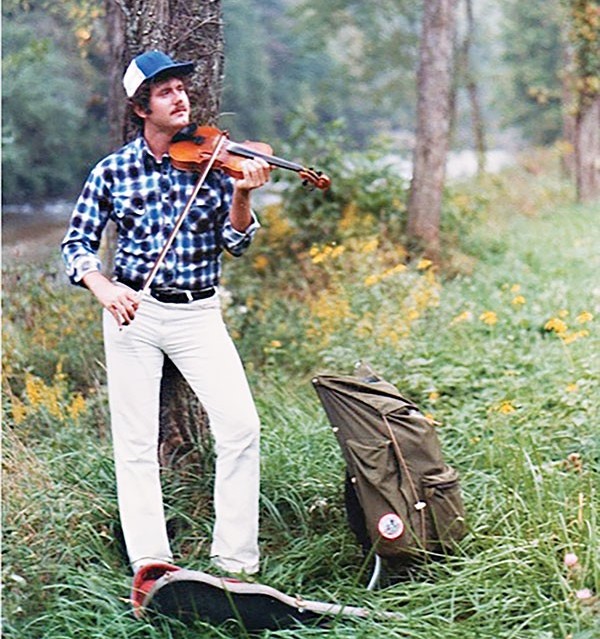
by Dr. Norris Frederick
“No one would choose to live without friends,
even if he had all the other good things.”
– Aristotle[1]

David McKnight
1966 high school yearbook
Aristotle is right: who would want to live a life without friends? We especially realize that when a friend moves away and most vividly when a friend dies. In January 2017, my friend David McKnight passed away. A man who already had endured many steep challenges in his life, he had been diagnosed in November with a massive and inoperable brain tumor. When the news came about the brain tumor, it seemed to foretell the sad end of a tragic life. Was it? Let me tell the story of David and of some of his friendships, and you can be the judge.
Halcyon Days
David wrote the sports column in our Garinger High School paper, was voted in 1966 the senior guy “Most Likely to Succeed,” and was a finalist for the highly esteemed Morehead Scholarship to UNC— Chapel Hill.
Perhaps my earliest memory of him is from Miss Mary Balle’s English class, where we read Chaucer, Shakespeare and all the greatest hits of Brit Lit. David was always full of energy, unable to repress his terrible puns, which we all secretly loved. Once he somehow turned a class discussion to a question of responsibility for actions just so he could say, “It’s neither my Faulk-ner yours that It happened.” All of us, including Miss Balle, groaned, and then we all laughed. The memory makes me smile.
He and I played tennis matches near his house, at Midwood Park. The tennis was fun, but David’s running commentary before, during, and after the match turned the game into struggles both hilarious and grand beyond words: Beowulf vs. Grindel. Rod Laver vs. Ken Rosewall. Madness vs. King Lear.
The Guy Most Likely to Succeed was accepted at prestigious Duke University. There he could continue his virtuoso violin, his study of multiple languages, history, journalism and whatever else struck his fancy. It looked like a cloudless blue sky.

David McKnight and Sybil Huskey
Most Likely to Succeed Garinger High 1966
A Few Clouds, Heroism, and Ah, Youth
Then there were surprises I never saw coming. David became the guy wearing the Duke Blue Devil costume at basketball games. Still full of hilarious and grand stories. Like the exam he refused to take because of a difference of opinion with the professor, thus an F. More F’s. Ultimately, a college career in which every course earned either an A or an F, according to David. He did not want a high-brow college education; he wanted a life of the rough and tumble of journalism.
After his sophomore year, he took a break from Duke. David told me one day in 1968 that he had decided to fly to Czechoslovakia to report on the Prague Spring liberalizations in that Communist country. Given the threat of an invasion by the Soviet Union, the decision seemed both sudden and perilous. The next day, I put him on a plane to Prague. He carried his manual typewriter in its case, and a gym bag containing a change of underwear and one clean shirt—that was it. It was crazy. And, I thought, heroic.
He published some fine stories on that trip, came back and got jobs with newspapers in Durham, Greensboro, and then in Fayetteville, where another of our close high-school friends lived. When my wife and I visited there, David and I played tennis in the hot summer morning sun. We all drank Tequila Sunrises afterwards. It was grand.
That night we all rode around the town, David with his beautiful and accomplished fiancée. We passed by a Fayetteville structure resembling the Eiffel Tower, and David cracked us up with, “When I saw the tower, I-fallaciously thought we were in Paris.” We were young, life was good
Reflections on Friendship
Philosophy begins with questions and problems that arise from our experience. As I look back on these early years of my friendship with David, as I wonder about what friendship really is and whether I really was David’s friend, my questions transport me from memory, narrative and emotion to more analytical thoughts about our relationship. Aristotle’s observations and thoughts about friendship, written over 2,300 years ago, are still helpful today.
Aristotle writes that friendship is love for each other, “reciprocated goodwill.”[2] We love people for different reasons, so we have three different kinds of friendship: one that are useful, pleasing, or good. [3]
“Now those who love each other for their utility do not love each other for themselves but in virtue of some good which they get from each other.”[4] The idea of a “friendship” being based on usefulness to one another might seem base, but think about a friend at work or a neighbor: you wish well to and feel affection for one another, but the cooperation and alliances form the basis of the relationship. These relationships may go no further than utility and tend not to last very long once the usefulness goes away, as we change workplaces or neighbors. What we love in such relationships is what is good for ourselves. We love the usefulness of the friend; we do not love the person for who he is.
The same is true for friendships based on pleasure. We enjoy our witty friend because of the pleasure she gives us, not for the person she is. Once we no longer enjoy our friend’s wit, these friendships tend to fade.
In a complete friendship, we “wish good things to [our] friends for the friends’ own sake…because of themselves.”[5] In a complete friendship, our friend feels the same way toward us, and we are also “both unconditionally good and beneficial to each other.”[6] Our friend has character traits that we love because they are good, and this friendship itself is intrinsically good.
Was my early friendship with David at least partly based on usefulness and pleasure? Well, yes, as I look back on it and ask myself this question for the first time. David came from a wealthier neighborhood than I, and he had gone to the “in” junior high, whereas I had gone to the “out” junior high, with a relatively higher number of poorer and intellectually weaker students. By becoming his friend, I moved up in social status and became accepted by David’s friends.
And certainly, his quick wit and good spirits gave me pleasure.
I was aware of some good character traits (aka “virtues”) he possessed, such as his intellectual persistence, curiosity, and sociability. Sharing and valuing the same virtues, for Aristotle,, form the basis of a complete friendship. But David had some bad character traits (aka “vices”) that made a complete friendship challenging. At times, he seemed to be a social climber, his attention and time quickly moving to someone else more important.
That’s ironic: I just realized that I criticized David for what I used him to do for myself, to climb up socially.
U.S Senate Candidate: Walking the State

David on U.S. Senate campaign walk from coast to mountains
Photo by Terry Wyler Webb
In 1977 David made another grand decision, reminiscent of his ’68 trip to Czechoslovakia: he decided to leave his job as a journalist to run for the U.S. Senate. He walked the entire distance of the state — 1,654 miles — from Manteo to Murphy, carrying a change of clothes and his fiddle.
He got lots of good press coverage, promising voters he would not “fiddle around” if they sent him to Washington. But that campaign was also when I first saw the cracks. He ran up large phone bills, came in 5th of 8 candidates in the Democratic primary, and destroyed his relationship with his fiancée. In my eyes, he was never quite the same after that campaign.
He lived here and there. He started spending more and more time playing with various bands. For a while he lived in a huge apartment in an old building in the French Quarter of New Orleans and played in a band on Bourbon Street.
In the 1980s David came into some money, offering the chance for financial stability. Once again he had a grand vision that he put into action. He traveled a good bit of the Eastern U.S., visiting symphony orchestras where during a performance he would donate to that orchestra an expensive violin that he had purchased from John Sipe’s Presidential Series.
Sipes named those violins after various presidents. David bought a few and then donated them to musicians or the orchestras in the cities where those presidents were born. For example, he went to Missouri to deliver the Harry Truman violin.[7] Often David performed, playing his violin with those orchestras.
Once he showed up at our house in Charlotte, his usual energetic story-telling self. “I am traveling around visiting all the best minor league baseball parks,” he said. “Three nights ago I was in Toledo, and then the night after that in Nashville, and last night the Asheville Tourists.” And then he would go into rich detail on the glories of each park and its history and the history of the city.
A Grand Life, Except…
It sounded a grand life, except for a couple of things. He almost always was alone on these long road trips. And it seemed more and more often the story would take a strange turn, “So right as I was coming into Charlotte I saw my odometer hit 400 miles, and that make me think that in another year it will be 400 years since the founding of the Old North State, and so I have an idea that could connect the Republicans and Democrats in that…” and suddenly I could no longer follow what he was saying.
At some point, maybe in the early 1990s, David no longer came back to Charlotte, and I lost touch with him. (Or did I just not try hard enough to keep up with him?) I eventually heard from friends he was living homeless in the Triangle, back and forth between Raleigh and Chapel Hill and Durham. He played his violin as beautifully as ever, but on the streets.
He never asked for money, but gratefully accepted it if offered by folks who were listening. He rarely bathed and smelled bad, and his clothes were dirty. That’s what it’s like if you’re homeless and living on the street. Going to a shelter was not something David was willing to do.
Next time: David’s Story Continues
Click here to post a comment on my website.
To send a comment directly to me, write no*************@***il.com
[1] Aristotle, Nichomachean Ethics, Book 8, chapter 1, translated and notes by C.D.C. Reeve (Indianapolis: Hackett Publishing, 2014).
[2] Book 8, Chapter 2
[3] Book 8, chapter 2.
[4] Book 8, chapter 3, W.D. Ross translation (The Internet Classics Archive, http://classics.mit.edu/Aristotle/nicomachaen.html )
[5] Book 8, chapter 3, emphasis added.
[6] Book 8, chapter 3.
[7] Thanks to David’s niece, Meg Whalen, for this information, via email.

Back in the mid 2000, I was successful in finding all the yearbooks on ebay from my years at Garinger High. The 1964 yearbooks belonged to David McKnight. I don’t remember how I found him but I did, and offered to send him his yearbook. He said he really didn’t have any room for it and I should just keep it. I never quite understood his response until now. I feel like I knew him even though we never met. Thank you for writing this article.
Jimmy,
Thanks so much for your comment on my website about my post on David McKnight. What a surprising and wonderful connection you shared about David’s yearbook!
I also graduated in 1966 with David. I played violin with him in the same orchestra.
Jean, thank you so much for sharing your connection with David and the orchestra!
Norris, thank you for an insightful tribute to a mutual friend and I look forward to the next part. (John Sipe made a 3-string Appalachian dulcimer as a gift from my parents for my 16th birthday. I still have it.)
Joan, thanks so much for your encouraging comment on my website post about David. What a surprising and wonderful connection to learn that you, like David, had a musical instrument made by John Sipe! Those kinds of unexpected connections, this time between two of my friends, make me shake my hand with wonder.
This is going to bring back a lot of memories to those of us who were with David at Garinger. The social climbing aspect of life was very important to us back then. Is it still today?
I am looking at evolution more closely these days. Wonder how friendships fit in with evolution? We evolved as humans because we were able to work together better than other species… this working together for protection and to find food must have led to friendships in some way. Need to think about this more… but in the meantime I am glad I have a lifelong friend like you, as I/we explore life.
Ike,
Thanks so much for your comments and provocative questions for us to think about as we examine philosophy for living our lives. Your point about friendship and evolution is most thought-provoking: “We evolved as humans because we were able to work together better than other species… this working together for protection and to find food must have led to friendships in some way.”
Norris, you have given us another excellent essay to think about. David’s choices in a life that could have gone in many different directions makes us question our assumptions of what is really important. After all, he died with many loyal friends by his side and left a legacy of music making, freedom of choice, and independent living that many might find enviable. “To each their own” or as Friedrich Nietzsche wrote: “He who has a WHY to live can bear almost any how”.
Rebecca,
Thank you so much for your insightful comments about David. You raise several good points that may help us to reexamine our own assumptions about what’s important for a good life. You quote from Nietzsche is very thought-provoking, ““He who has a WHY to live can bear almost any how.”
Norris, love your stories about David. He obviously had and still has an impact on your life. Miss Balle was my favorite teacher of all time! We were both so fortunate to be taught by her.
Cynthia, thanks so much for your comment on my website post about David. Mary Balle was my favorite Garinger teacher, too; an amazing woman! Glad to know we share that connection.
I’m loving reading your story and look forward to the next chapters. Thank you. I knew of David at Garinger. I married a ‘65 grad, I am a ‘67 grad, and my older sister a ‘62 grad. We Garinger folks like to try to stay in touch!
Melanie, thanks so much for your comment on my website post about David. Good to hear from another Garinger grad!
You can weave a story, Norris! Looking forward to the next installment 🙂
Teri, thanks so much!
Teri, thanks so much!
Aristotelian wisdom on friendship, your connection to David and his peripatetic life, and a cliffhanger pause. Nicely done.
Ira,
Thanks so much for your encouraging comment on my website about my post on David.
Norris, Thank you for posting this tribute to David. I am thinking that I was in orchestra with David in junior high school and knew him to some degree. I am saddened to hear of these life experiences he went through, so thank you for your beautiful and honest tribute to him. I look forward to more of your writings.
Phyllis, thanks so much for your encouraging comment on my website about my post on David. It’s good to know you were in the orchestra with David in junior high school.
Wow on so many levels! I too played tennis at Midwood Park during the late 60’s and I went to Garinger. I lived on Chambwood Dr. I was not the student that David was. I didn’t know David but may well have crossed his path. I detect differences. I have a wonderful wife, 4 grown children, and 10 grandchildren. But I struggled through the years with relationships. It’s seems David never met a stranger. I’m just the opposite. My main takeaway: In the spring of ’72 I received Jesus Christ. Not to judge but I wonder if David ever did.
Doug, thanks for your comment! It’s so interesting that you too played tennis at Midwood Park!